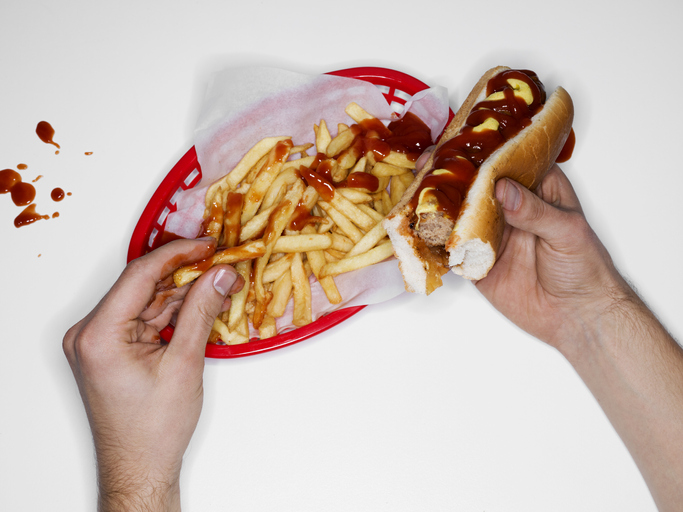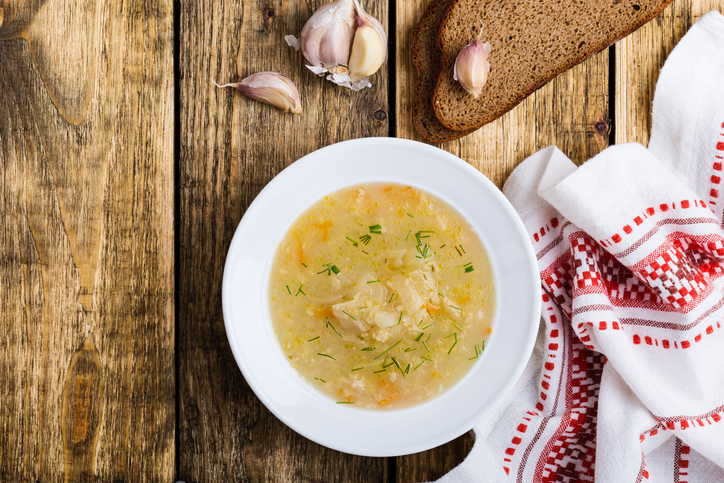Not All Comfort Foods Have To Be Unhealthy

The topic of “comfort foods” is one of my favorites, because it involves understanding the connection between mood and food. More specifically, I’m talking about how a person’s mental state may influence their food choices.
It’s as simple as this: research has shown that, overall, happier people make healthier food choices, and people who feel depressed, angry, anxious or sad tend to go for unhealthier foods to provide “comfort.”
“Research reveals that although some guilty pleasures will indeed make you feel good in the short term, your desire to reach for a piece of chocolate instead of a carrot might also depend on your mood,” according to Psychology Today.
This may be a hard concept for some people to embrace, because food is such a celebratory part of our culture. We often celebrate happy moments, such as birthdays and job promotions, with foods like cake, donuts and pizza (popular comfort foods). So we don’t necessarily need to feel "down" to reach for typical comfort foods, but comfort food eating when we are sad or in a negative head space is definitely a form of self-medication that needs to be addressed, especially as we fight isolation, boredom and anxiety during this COVID-19 pandemic.

In fact, a recent Forbes article states that Americans are buying more frozen comfort foods at the grocery store due to the coronavirus.
“Although frozen vegetables and meat are popular categories, pizza and other comfort foods are also high on the list. Consumers are buying more multi-serve entrees such as lasagna and pot pies. They are also purchasing frozen desserts and snacks. During times of stress and uncertainty, some people turn to comfort food to cope.”
Frozen foods and meals are convenient and have a longer shelf life (which is part of the reason why so many Americans are currently buying them), but it’s clear that people are also turning to these salty, sugary, nutrient-void frozen items to simply feel better.
Yes and no.
Typical comfort foods, cakes and other sweets, sodas, ice cream, store bought mac and cheese and pizza, are foods that if consumed regularly can lead to health issues such as obesity, hypertension, diabetes, cancer and even depression. That’s right. Your comfort foods may actually contribute to depression in the long-run.
But in moments of sadness, stress and even boredom, these comfort foods may act as a quick (although temporary) solution to how bad you may be feeling at that particular moment.
The Psychology Today report mentioned earlier highlights the work of researchers who have thoroughly examined food, mood and the effect of comfort foods.
“They note that foods used to counteract such negative affective states are usually sweet, fatty, carbohydrate-rich, and indulgent, because such choices provide immediate satisfaction, and can even have psycho-physical benefits.”
Take sugar, for example. People often self-medicate with sugar, because a heavy surge of sugar increases dopamine (a neurotransmitter that makes us feel pleasure and reward) levels in the brain. This is why sugar can be extremely addicting and some may compare it to being just as addictive as drugs.
There is some evidence showing that in humans, “...sugar and sweetness can induce reward and craving that are comparable in magnitude to those induced by addictive drugs.”
Comfort foods that are junk foods (which are ultra-processed) are for many people foods that remind them of their childhood or happy times. Many of these foods are related to certain rituals. For example, maybe you usually eat pizza every Friday night with your friends or overindulge on ice cream every Sunday with your significant other.
“People who turn to comfort food for solace are often seeking to satisfy emotional needs, not hunger,” according to Psychology Today.
“Simply put, comfort food is food that produces a pleasant emotional state.”
So by actual definition, comfort foods are not necessarily junk foods. Of course, they can be and usually are. However, comfort foods can also be healthy. For some people, maybe a bowl of hot oatmeal with nuts and cinnamon is comforting despite being healthy because it reminds them of being a child and getting a warm meal from their parents.
With that said, it’s time to change our perspective on comfort foods. If you have children, start introducing them to healthy comfort foods so that when they are adults they have a higher chance of reaching for healthier items when they may be sad, stressed or anxious.
What are some healthy confort foods?
One of my favorites is homemade chicken soup. This definitely reminds me of my childhood and comfort.
We have to start viewing comfort foods as foods that will contribute to good health, not foods that give us a sugar rush and make us temporarily feel better. If you consistently eat healthily, these (healthy) foods may provide comfort during hard times.
The Psychology Today report refers to an article called 8 Foods that Help with Anxiety and Stress.
Here are a few food swaps this article recommends:
- Asparagus instead of french fries (you can even try these baked asparagus fries)
- Avocados instead of ice cream (test out a chocolate avocado shake)
- Blueberries instead of cakes and other sweets (blueberries with Greek yogurt is a great dessert or snack for when you have a sweet craving)
- Lean turkey instead of fried chicken
- Almonds instead of cookies
- Yogurt instead of milk and cereal (so many cereals are sugary and processed. Be sure to pick a yogurt that is sugar-free or low in sugar)
- Kale or arugula instead of iceberg lettuce (iceberg lettuce is pretty much nutrient-void, but kale and arugula are packed with essential vitamins and minerals)
- Salmon instead of steak (Salmon is rich in heart-healthy fatty acids. Steak in moderation may be fine, but if you are craving red meat such as a burger from your local drive thru, go for salmon instead)
Be proactive, and think about how you can find healthier alternatives to some of your favorite unhealthy comfort foods. If you need some help, let us know. We would be happy to make some healthy suggestions.
(As always, it is advised that you seek the advice of a competent healthcare professional regarding what foods you are including in your diet, especially if you are pregnant, breastfeeding or have any existing health issues).
Enjoy your healthy life!
The pH professional health care team includes recognized experts from a variety of health care and related disciplines, including physicians, attorneys, nutritionists, nurses and certified fitness instructors. This team also includes the members of the pH Medical Advisory Board, which constantly monitors all pH programs, products and services. To learn more about the pH Medical Advisory Board, click here.







